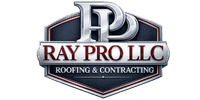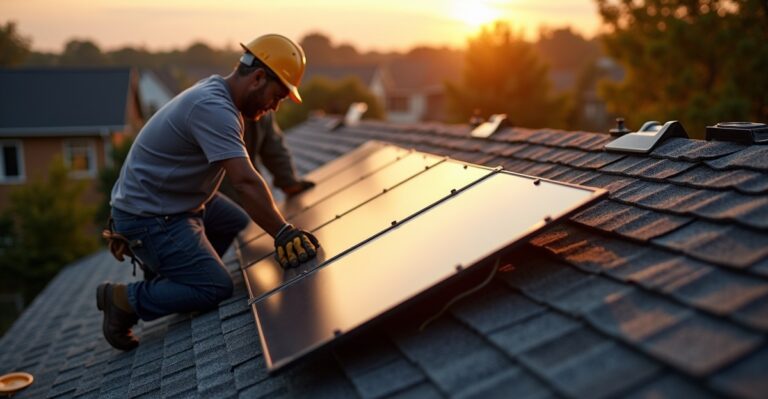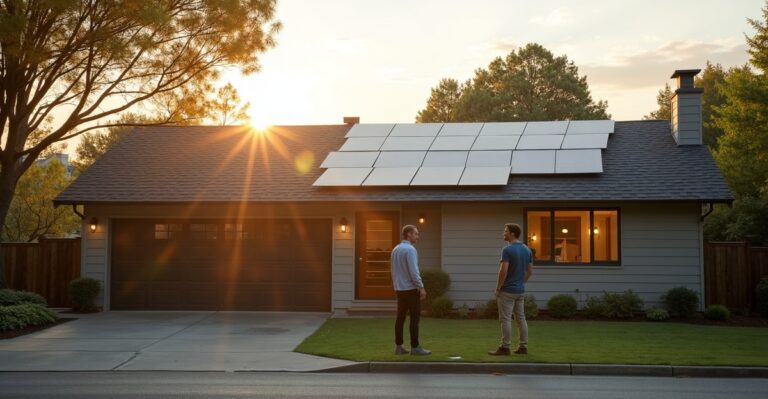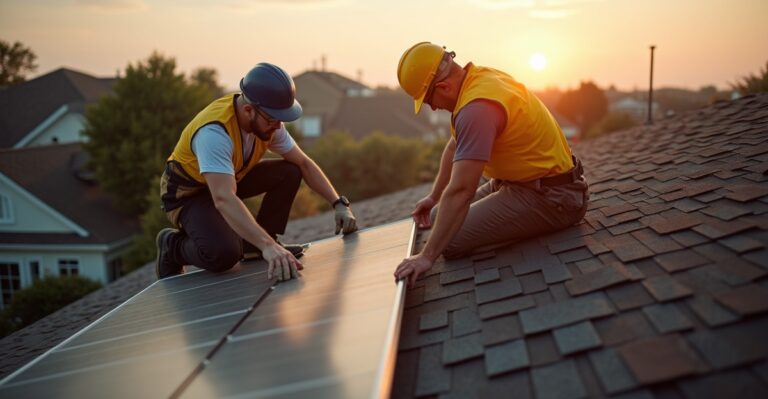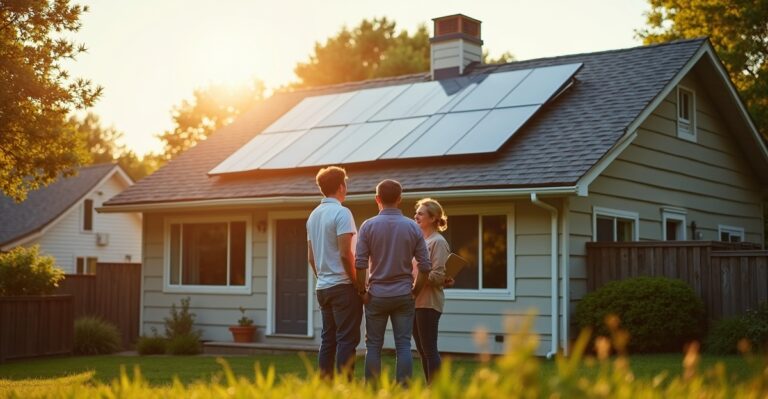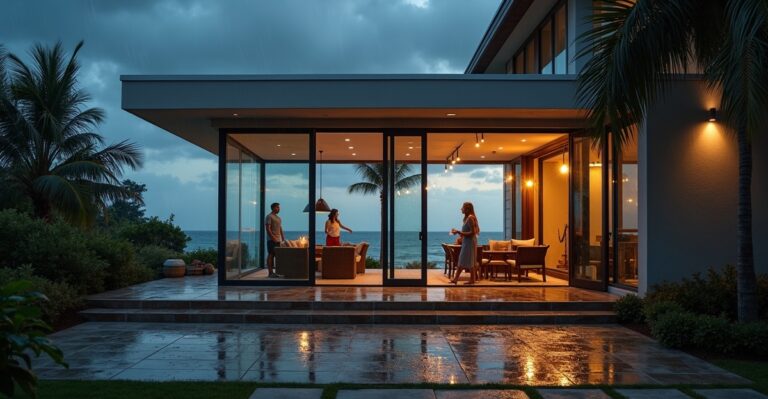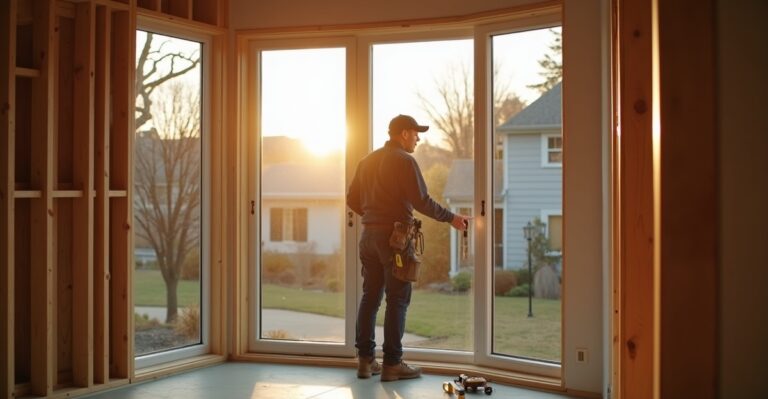What Are Metal Tile Roofs & Why Choose Them?

When it’s time to upgrade your roof—whether due to storm damage, aging infrastructure, or a need for better energy efficiency—a metal tile roof offers a blend of style, strength, and long-term value. Designed to mimic the look of traditional tiles while delivering superior durability and performance, metal tile roofs are becoming a smart choice for both homeowners and commercial property managers.
In this article, we’ll walk you through what metal tile roofs are, their key benefits, how they compare to other roofing options, and why they might be the best solution for your property. You’ll also learn about installation factors, long-term value, and how RayPro supports clients with expert service, financing options, and industry-leading warranties.
Here’s what we’ll cover:
- What Is a Metal Tile Roof?
- Key Benefits of Metal Tile Roofing
- Metal Tile Roof vs. Traditional Roofing Materials
- How Long Do Metal Tile Roofs Last?
- Installation & Maintenance Considerations
- Is a Metal Tile Roof Worth It?
- Why Choose RayPro for Metal Tile Roofing?
- Conclusion: Is a Metal Tile Roof Right for You?
First, let’s understand exactly what a metal tile roof is—and why more property owners are turning to it as a reliable, attractive option.

What Is a Metal Tile Roof?
A metal tile roof is a roofing system designed to replicate the appearance of traditional clay, slate, or concrete tiles—while offering the durability and performance benefits of metal. These tiles are typically made from materials like galvanized steel or aluminum, which are formed into shapes that resemble classic roofing styles. The result is a roof that blends architectural beauty with modern-day strength and efficiency.
Unlike conventional tile roofs that can be heavy and brittle, metal tile roofs are significantly lighter and more impact-resistant. This makes them especially appealing in regions prone to extreme weather, such as Florida, where high winds, hail, and heavy rain can take a toll on less resilient materials. Many modern metal tiles also come with stone-coated finishes or high-performance coatings that enhance their corrosion resistance, UV reflectivity, and curb appeal.
For example, a metal roof that looks like clay tile may have the same warm, Mediterranean aesthetic but won’t crack or absorb water over time. And thanks to interlocking panel systems and advanced fastening methods, metal tile roofs offer superior protection against wind uplift—an important factor in hurricane-prone areas.
To better understand how these systems are tested for resilience and compliance, explore this guide on metal roof performance standards and testing.
In short: a metal tile roof gives you the best of both worlds—timeless design and forward-thinking performance. Whether you’re aiming for elegance or endurance, it’s a roofing solution built to last.

Key Benefits of Metal Tile Roofing
Choosing a new roofing system is a major investment, and metal tile roofing offers a range of benefits that appeal to both residential homeowners and commercial property managers. From unmatched durability to energy efficiency and standout curb appeal, here’s why more property owners are making the switch to metal tile roofs.
Durability & Weather Resistance
One of the biggest advantages of metal tile roofing is its exceptional durability in the face of extreme weather. These roofs are engineered to withstand harsh conditions—making them an ideal choice for areas like Florida and other storm-prone regions.
- Hail Resistance: Unlike traditional tiles that can crack or shatter on impact, metal tiles resist denting and damage from hail. Many options are UL 2218 Class 4 rated—the highest available for impact resistance.
- Wind Uplift Rating: Properly installed metal tile roofs can withstand winds of up to 120–160 mph, meeting or exceeding hurricane zone requirements. You can also learn how to upgrade to a wind-resistant roof cover to further mitigate storm risks.
- Fire Resistance: Most metal tile systems are non-combustible and rated Class A for fire safety—the highest available rating—offering peace of mind in wildfire-prone or high-heat areas.
Whether you’re protecting a home, retail center, or multi-family building, the long-term strength of metal roofing reduces maintenance and replacement costs over time.
Energy Efficiency & Reflectivity
Metal tile roofs don’t just shield your property—they can also help reduce energy bills. Thanks to high reflectivity coatings and naturally radiant surfaces, metal tiles reflect more sunlight than darker roofing materials.
- In hot climates like Florida, this reduces heat absorption and helps maintain cooler indoor temperatures.
- Many metal roofs meet Energy Star® certification standards or qualify for local energy efficiency incentives.
- Combined with proper roof insulation and ventilation, a metal tile roof can significantly improve your building’s thermal performance.
These benefits make them an eco-friendly roofing solution that supports both comfort and cost savings.
Curb Appeal & Style Options
Metal tile roofing isn’t just functional—it’s visually striking. Whether you’re going for modern minimalism or old-world charm, these tiles are available in a wide range of colors, textures, and profiles.
- Mediterranean clay, Spanish barrel, slate, and wood shake looks are all achievable with metal tile systems.
- Stone-coated finishes offer a textured, traditional appearance with added surface protection.
- Because the material resists fading, warping, or algae growth, it maintains its appearance for decades—boosting long-term curb appeal and property value.
For homeowners who want a roof that elevates their home’s design—or commercial property managers looking to maintain a polished exterior—metal tile roofs offer beauty without compromise.
Quick Benefits Checklist
- Hail, wind, and fire-resistant
- Reflects heat and lowers cooling costs
- Stylish options that mimic traditional tiles
- Lightweight yet long-lasting
- Minimal maintenance over time
Bottom line: Metal tile roofs are more than just protective—they’re a smart, stylish investment in your property’s future.’s future

Metal Tile Roof vs. Traditional Roofing Materials
When evaluating roofing options, it’s essential to understand how a metal tile roof compares to more traditional materials like asphalt shingles and clay or concrete tiles. Each has its own strengths, but metal tiles consistently stand out for their durability, longevity, and overall value—especially for property owners looking for long-term performance with less maintenance.
Below, we compare the key differences between metal tile roofing and two common alternatives.
Metal Tile vs. Asphalt Shingles
Asphalt shingles are the most widely used roofing material in the U.S., primarily because of their low upfront cost. However, that affordability comes with trade-offs in lifespan, durability, and energy performance.
Key Differences:
- Lifespan: Asphalt shingles typically last 15–25 years, while metal tile roofs can exceed 40–70 years with minimal upkeep.
- Weather Resistance: Shingles are more susceptible to wind uplift, heat damage, and algae growth. In contrast, metal tiles offer superior hail resistance, wind ratings, and fire resistance.
- Energy Efficiency: Asphalt absorbs heat, increasing cooling loads in warmer climates. Metal roofs reflect solar radiation, helping to reduce indoor temperatures and utility bills.
Bottom line: If you’re thinking long-term, metal tile roofing may cost more upfront but offers significantly more value over time.
Metal Tile vs. Clay/Concrete Tile
Clay and concrete tiles are prized for their aesthetics, particularly in Mediterranean or Spanish-style homes. But despite their visual appeal, they present challenges in weight and fragility.
Key Differences:
- Weight: Clay and concrete tiles are extremely heavy and often require structural reinforcement. Metal tiles are much lighter, reducing strain on the building and simplifying installation.
- Durability: Traditional tiles can crack under impact (like hail or falling branches), while metal tile roofing resists breakage and is better suited for high-wind zones.
- Maintenance: Clay tiles may require periodic sealing and more frequent inspections. Metal tile roofs typically require far less ongoing maintenance.
Bottom line: Metal tiles offer similar aesthetic benefits with less maintenance, lighter weight, and better weather resilience—especially important in storm-prone areas like Florida.
At-a-Glance Comparison Table
| Feature | Metal Tile Roof | Asphalt Shingles | Clay/Concrete Tile |
| Average Lifespan | 40–70 years | 15–25 years | 30–50 years |
| Weight | Light | Moderate | Heavy |
| Wind Resistance | Up to 160 mph | 60–110 mph | Varies (Often <125 mph) |
| Hail/Impact Resistance | High (Class 4) | Low to moderate | Moderate to low |
| Fire Rating | Class A (non-combustible) | Varies by product | Often Class A |
| Maintenance Needs | Low | Moderate | High |
| Energy Efficiency | High (reflective coatings) | Low | Moderate |
| Curb Appeal | High (many styles/finishes) | Moderate | High (but heavy) |
| Installation Cost | Moderate to high upfront | Low upfront | High upfront + structural costs |
In summary: Metal tile roofing offers the perfect balance between style, strength, and sustainability—outperforming traditional materials in nearly every category that matters.

How Long Do Metal Tile Roofs Last?
One of the most compelling reasons homeowners and property managers choose a metal tile roof is its impressive lifespan. While traditional roofing materials often require replacement within 15–30 years, metal tile roofs are built to last 40 to 70 years or more, depending on the quality of installation, materials used, and regional climate conditions.
Average Lifespan and Performance
Metal tile roofs typically outperform asphalt shingles, wood shakes, and even many concrete tiles when it comes to longevity. Their resistance to corrosion, UV damage, mold, and pest infestation means fewer issues over time—especially in coastal or humid environments like Florida.
- Galvanized steel and aluminum metal tiles, when properly installed and maintained, can last upwards of 50 years.
- Premium metal tiles with stone-coated finishes may reach or exceed 70 years of service life.
- Their performance is especially notable in hurricane-prone areas, where strong wind uplift ratings and impact resistance help preserve structural integrity over time.
How Climate Affects Longevity
In regions with extreme weather—heat, humidity, hurricanes, or heavy rainfall—metal tile roofing offers superior resilience:
- In hot climates, reflective coatings help reduce thermal cycling (expansion and contraction), which can degrade other roofing types.
- In storm-prone areas, high wind resistance and interlocking panel systems prevent damage from uplift and flying debris.
- In humid or coastal environments, metal tiles resist rust and corrosion better than many materials, especially when treated with protective coatings.
This makes metal tile roofing particularly well-suited for Florida and other southeastern states where traditional roofs may deteriorate more quickly.
Warranty Coverage
Many metal tile roof systems come with warranties ranging from 30 to 50+ years, depending on the manufacturer and installer. These often cover:
- Material defects
- Coating performance (such as fading or chalking)
- Wind and impact resistance guarantees
Working with a trusted contractor like RayPro may also give you access to extended workmanship warranties, manufacturer-certified installation, and guidance on the importance of roof flashing. This includes proper roof safety assessment and ongoing quality assurance.
Lifespan Comparison Timeline (Visual Suggestion)
| Roofing Material | Average Lifespan |
| Asphalt Shingles | 15–25 years |
| Wood Shakes | 20–30 years |
| Clay/Concrete Tiles | 30–50 years |
| Metal Tile Roof | 40–70+ years |
Key takeaway: A metal tile roof isn’t just a short-term upgrade—it’s a multi-decade solution. With the right product and a qualified installer, you’ll likely only replace your roof once in a lifetime.

Installation & Maintenance Considerations
Choosing a metal tile roof means investing in long-term performance and reliability—but it’s also important to understand what goes into the installation process and what kind of maintenance you can expect over time. While metal tile roofing may require a higher upfront investment than other materials, the ease of upkeep and durability often make it the more cost-effective choice in the long run.
What Affects Installation Cost?
The cost of installing a metal tile roof can vary based on several property-specific factors. Here’s what typically influences the total project cost:
- Roof Size and Complexity: Larger roofs or those with complex shapes, dormers, and valleys will require more materials and labor.
- Roof Slope (Pitch): Steeper roofs are more labor-intensive and may require additional safety equipment and precautions.
- Existing Roof Structure: If your current roof needs to be removed or your home requires reinforcement (less common with lightweight metal tiles), costs can increase. This is especially true in projects involving a full residential roof replacement.
- Material Choice: Premium options, like stone-coated metal tiles or custom finishes, may add to the cost—but they also enhance curb appeal and longevity.
- Location and Code Requirements: Regional building codes (such as hurricane standards in Florida) may influence material and installation specifications.
While the initial investment in a metal tile roof is generally higher than with asphalt shingles, it’s important to factor in the decades of added life, energy savings, and reduced maintenance it delivers.
Maintenance Requirements
One of the most appreciated advantages of metal tile roofing is its minimal maintenance compared to traditional materials.
- No cracking or warping: Unlike clay tiles or wood shakes, metal tiles won’t split, curl, or rot over time.
- Low susceptibility to mold or moss: Especially in humid climates, metal’s smooth surface resists biological growth.
- Fade-resistant finishes: Quality coatings help maintain color and appearance, reducing the need for repainting or surface treatments.
- Periodic inspections recommended: Like any roof, it’s wise to have it inspected every few years or after major storms to check fasteners and flashing—and to follow tile roof maintenance tips that help extend its lifespan.
For most property owners, maintaining a metal tile roof involves little more than occasional debris removal from gutters and routine visual checks.
In summary: While metal tile roofs may involve a higher up-front investment, their low-maintenance nature and long-term reliability more than make up for it—especially in climates where other materials struggle to hold up.

Is a Metal Tile Roof Worth It?
Investing in a metal tile roof is about more than just protecting your property—it’s about maximizing long-term value, minimizing future headaches, and improving your building’s overall performance. While the upfront cost may be higher than other roofing options, the return on investment (ROI) is often significant, especially for property owners in high-wear climates like Florida.
Homeowners: Energy Savings, Durability, and Curb Appeal
For homeowners, a metal tile roof can pay off in multiple ways:
- Lower Energy Bills: Thanks to reflective coatings and superior thermal performance, metal tile roofs help regulate indoor temperatures by reducing heat absorption—especially critical in hot, sunny states.
- Long-Term Durability: With a lifespan of 40–70+ years, metal tile roofing reduces the likelihood of needing costly repairs or premature replacement.
- Increased Resale Value: A high-quality metal roof enhances your home’s curb appeal and is a strong selling point for future buyers.
- Peace of Mind: Homeowners gain confidence knowing their roof can withstand hurricanes, hailstorms, and fire, all while requiring minimal maintenance.
If you’re planning to stay in your home for the long haul—or want a roof that adds tangible value when it’s time to sell—a metal tile roof is a smart, future-focused investment.
Commercial Property Owners: Operational Benefits & Cost Control
Commercial property managers and owners appreciate metal tile roofing for its reliability, efficiency, and reduced overhead.
- Fewer Disruptions: Metal roofs require minimal maintenance and are less likely to fail, which helps avoid unplanned downtime in office buildings, retail centers, or multi-family properties.
- Insurance Advantages: Due to high ratings for fire and wind resistance, some insurers offer reduced premiums for metal roofing systems. This can be enhanced further by integrating roof flashing installation and other performance components.
- Long-Term Budgeting: With longer service life and fewer repair needs, metal tile roofing simplifies forecasting and minimizes lifecycle costs.
- Professional Appearance: The sleek, clean look of metal tile helps maintain a strong visual presence for your business or brand.
For commercial decision-makers focused on performance and protecting their bottom line, metal tile roofing delivers both aesthetic and financial ROI.
Bottom line: Whether you’re a homeowner looking for comfort and curb appeal, or a commercial property owner seeking efficiency and protection, a metal tile roof is absolutely worth the investment. It delivers decades of value, security, and peace of mind in even the most challenging climates.

Why Choose RayPro for Metal Tile Roofing?
When it comes to installing a metal tile roof, the product you choose matters—but so does the contractor. At RayPro Roofing & General Contracting, we combine high-quality materials with decades of hands-on experience to deliver roofing solutions that are built to last and backed by service you can trust.
As a full-service roofing and general contracting company, we understand the unique challenges property owners face—especially in weather-prone states like Florida. That’s why we offer more than just installation. We provide guidance, support, and peace of mind at every stage of the process—from roof coating and protective upgrades to complete structural assessments.
What Sets RayPro Apart?
- Certified & Experienced Installers: Our teams are trained in best practices for metal tile roofing systems, ensuring proper installation for long-term performance and warranty protection.
- Full-Service Project Management: From the initial inspection to final cleanup, we handle every detail—so you don’t have to juggle multiple contractors.
- Financing Options Available: We offer flexible financing solutions to make metal roofing more accessible, whether you’re managing a home renovation or a commercial upgrade.
- Industry-Leading Warranties: We work with trusted manufacturers that offer 30–50+ year warranties—and we stand behind our own workmanship, too.
- Licensed, Insured & Local: RayPro operates across 17 states with a strong local presence and an unwavering commitment to service and safety.
When you choose RayPro, you’re not just getting a roof—you’re gaining a trusted partner dedicated to protecting your property and your peace of mind.

Conclusion: Is a Metal Tile Roof Right for You?
A metal tile roof offers an unbeatable combination of strength, style, and long-term value. It mimics the beauty of traditional tile while outperforming other roofing materials in durability, energy efficiency, and minimal maintenance—making it a top choice for both homeowners and commercial property managers.
We’ve covered the key benefits, compared it to common alternatives, and explored how it holds up in tough climates like Florida. Whether you’re focused on curb appeal, ROI, or simply peace of mind, metal tile roofing delivers a smart, lasting solution.
If you’re considering a roofing upgrade and want a system that’s as reliable as it is visually appealing, a metal tile roof may be exactly what you need.
Ready to take the next step? Contact us today to schedule your consultation or request a quote. Let’s build something strong, beautiful, and built to last.
Frequently Asked Questions
This is a common misconception. When installed with proper underlayment and attic insulation, metal tile roofs are no noisier than other roofing materials. In fact, many homeowners report that the sound is barely noticeable—especially when modern acoustic barriers are used during installation.
While asphalt shingles typically cost less upfront, a metal tile roof offers greater long-term value. The initial investment for metal tile roofing can be 2–3 times higher than shingles, but the extended lifespan (40–70+ years), lower maintenance, and energy savings often offset the difference over time.
High-quality metal tiles are engineered to resist corrosion and rust, even in coastal or humid environments. Materials like galvanized steel and aluminum, when coated properly, provide excellent protection against salt air and moisture. Choosing a contractor familiar with coastal climate requirements—like RayPro—can further ensure longevity.
Yes. Metal tile roofs are among the most wind-resistant roofing systems available, often rated to withstand winds up to 160 mph. This makes them an ideal solution for homes and buildings in hurricane-prone regions such as Florida and the Gulf Coast. Interlocking panels and secure fastening systems add extra protection against wind uplift.
Absolutely. Commercial property owners value low maintenance, long-term durability, and energy efficiency—all of which metal tile roofs deliver. Whether it’s a retail center, office building, or multi-family housing, metal tile roofing helps reduce operating costs and supports a professional, attractive appearance for decades.
